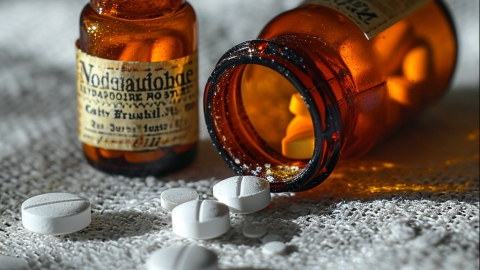What are the efficacy and side effects of Irbesartan tablets?
Generally, the therapeutic effects of Irbesartan tablets include lowering blood pressure, protecting the heart, reducing proteinuria, improving vascular endothelial function, and preventing stroke. Side effects may include cough, rash, angioedema, abnormal liver function, dizziness, and fatigue. It is recommended to use this medication according to medical advice. Detailed analysis is as follows:

I. Therapeutic Effects of Irbesartan Tablets
1. Lowering Blood Pressure
Irbesartan tablets selectively block the binding of angiotensin II to its receptors, causing vascular smooth muscle relaxation, thus dilating blood vessels and effectively lowering blood pressure. It is suitable for the treatment of essential hypertension.
2. Protecting the Heart
Irbesartan tablets can inhibit myocardial cell proliferation and hypertrophy, reduce the burden on the heart, improve cardiac remodeling, and have preventive and therapeutic effects on cardiac lesions such as myocardial hypertrophy caused by hypertension, thereby reducing the risk of heart disease.
3. Reducing Proteinuria
For patients with hypertension complicated by kidney disease, this medication can improve renal hemodynamics, reduce glomerular pressure, decrease urinary protein excretion, protect kidney function, and delay the progression of kidney disease.
4. Improving Vascular Endothelial Function
This medication helps restore normal function of vascular endothelial cells, promotes the release of vasodilating substances such as nitric oxide, improves vascular dilation and constriction function, and reduces vascular damage and the occurrence of atherosclerosis.
5. Preventing Stroke
By effectively controlling blood pressure, the medication reduces the risk of cerebral vascular rupture and occlusion, thereby playing a preventive role in cerebrovascular diseases such as stroke and reducing cerebrovascular events caused by hypertension.
II. Side Effects of Irbesartan Tablets
1. Cough
Irbesartan tablets act on the renin-angiotensin system and inhibit the production of angiotensin II. This causes reduced degradation of bradykinin, leading to its accumulation in the body. Bradykinin can stimulate cough receptors in the respiratory tract, causing persistent mild to moderate dry cough, which may affect the patient's daily life and rest.
2. Rash
The individual's immune system may recognize some components of Irbesartan tablets as foreign antigens. After initial exposure, antibodies sensitize lymphocytes. Upon re-exposure, antigen-antibody binding triggers an immune reaction, releasing inflammatory mediators such as histamine, leading to skin vasodilation and increased permeability, resulting in symptoms such as erythema, papules, and pruritus.
3. Angioedema
The medication may trigger abnormal immune reactions and activate the complement system. The activated complement components cause vascular endothelial cells to release vasoactive substances, leading to a sharp increase in vascular permeability and fluid leakage, resulting in angioedema in areas such as the face, lips, and tongue. Severe cases may involve airway obstruction affecting respiration.
4. Abnormal Liver Function
Irbesartan is mainly metabolized in the liver, and its metabolites may exert direct toxic effects on hepatocytes. The medication may interfere with normal metabolic pathways within liver cells, affecting the liver's detoxification and synthesis functions, leading to elevated liver enzymes. A few patients may develop jaundice, indicating liver damage.
5. Dizziness and Fatigue
While lowering blood pressure, Irbesartan tablets may cause short-term changes in cerebral perfusion pressure. If blood pressure drops too quickly or becomes excessively low, it may cause insufficient cerebral blood supply, resulting in dizziness. Additionally, the medication may affect neural regulation of energy metabolism in the body, causing fatigue and affecting daily activities and work capacity.
During treatment with Irbesartan tablets, blood pressure and serum potassium levels should be monitored regularly to assess blood pressure control and potassium levels. Avoid consuming excessive amounts of potassium-rich foods, such as bananas, oranges, and spinach, to prevent hyperkalemia.








